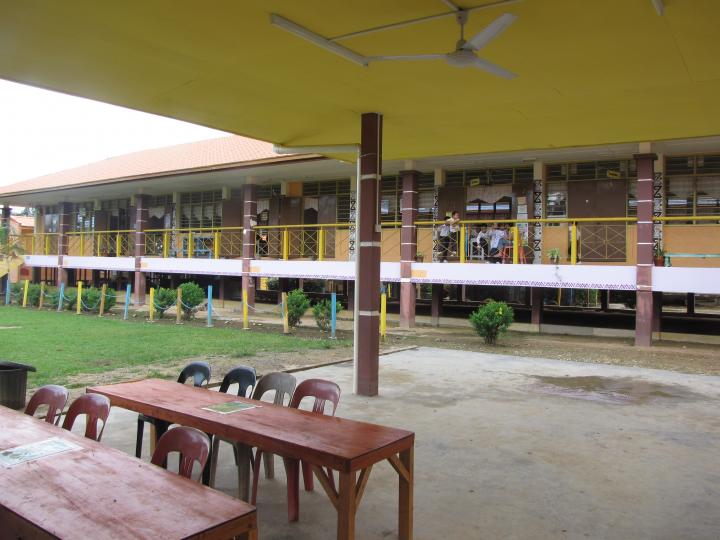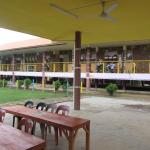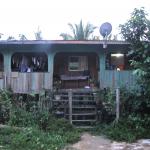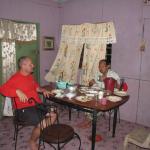Home Stay in Malaysian Borneo
While visiting Malaysian Borneo, we took advantage of a home stay program offered by the visitors centre in the village of Bata Puteh. Since my husband Dave and I are both teachers we were delighted to be assigned to the home of a teacher, thirty -six year old Sanih and his wife Hanina. They have five children ages thirteen and under.
Their house was located on the schoolyard and set on stilts. It had a corrugated tin roof and wooden walls whose paint had been bleached off by the hot sun. The porch housed multiple clotheslines heavy with drying laundry and a barrel for collecting rainwater. A wire fence around the house prevented the family’s chickens from straying too far. The wooden floor inside had patches of chipped and cracked linoleum. Hammocks for sleeping children hung from the ceiling of the main room.
We arrived while school was still in session and Sanih, who spoke excellent English, invited us to visit his grade two classroom. The school was clean and brightly painted and the children looked happy. The school day is long. Sanih’s wife Hanina goes over to the school kitchen at 4:30 each weekday morning to begin preparing breakfast for the grades 4-6 students who arrive at 6 am. They go to school till noon when the grades 1-3 students arrive to have a lunch that Hanina also prepares, and then begin their classes that run till 5 pm.
Sanih came home from school at 5:30 and after changing out of his pressed khaki pants and white shirt, he donned a sarong and went into a private room to pray. He emerged half an hour later and went to the local market with his wife to buy food for our dinner. When the family doesn’t have visitors, Sanih heads off after his eleven -hour teaching day ends, for several more hours of work on the small oil palm plantation he operates. This business brings in the extra cash he requires for his growing family.
On Fridays after school, Sanih gets in his car and makes a six- hour drive to the capital city. The government of Malaysia is funding college courses for him and he spends all day Saturday in class before making the six- hour drive home. He must maintain good marks in his Saturday classes or his funding will be cut off. Upgrading academically will mean he gets a better pension when he retires.
Sanih is carefully saving his money so in the future he can send his five children to a private Muslim high school in a city about ninety miles from their home. He wants them to get the best education possible. He knows he will never have money to travel so instead he and Hanina open their home to tourists. By visiting with the people from around the world who come to stay with them, Sanih says he gets to travel vicariously.
Hanina prepared a delicious meal of rice, grilled fish, squid and vegetables for us. She presented us with a silver teapot that held water to wash our hands before the meal. We ate with our fingers. The children were all very friendly but seven- year old Hana was especially gregarious and wanted to draw pictures for me, read to me and sit on my lap.
I asked Sanih how he has the energy to maintain his labor- intensive schedule that includes teaching, farming, parenting, studying and time for daily prayer and entertaining visitors. He says his motivation comes from his passion for his profession. “I love being a teacher”, he said.
 ThingsAsian
ThingsAsian



















